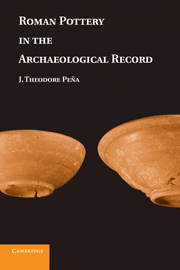Book contents
- Frontmatter
- Contents
- Tables
- Figures
- Maps
- Acknowledgments
- Introduction
- 1 A Model of the Life Cycle of Roman Pottery
- 2 Background Considerations
- 3 Manufacture and Distribution
- 4 Prime Use
- 5 The Reuse of Amphorae as Packaging Containers
- 6 The Reuse of Amphorae for Purposes Other than as Packaging Containers
- 7 The Reuse of the Other Functional Categories of Pottery
- 8 Maintenance
- 9 Recycling
- 10 Discard and Reclamation
- 11 Modeling the Formation of the Roman Pottery Record
- Appendix: Amphora Classes Referred to in the Text
- Maps
- Endnotes
- Bibliography
- Index of Ancient Texts Cited
- General Index
10 - Discard and Reclamation
Published online by Cambridge University Press: 06 August 2009
- Frontmatter
- Contents
- Tables
- Figures
- Maps
- Acknowledgments
- Introduction
- 1 A Model of the Life Cycle of Roman Pottery
- 2 Background Considerations
- 3 Manufacture and Distribution
- 4 Prime Use
- 5 The Reuse of Amphorae as Packaging Containers
- 6 The Reuse of Amphorae for Purposes Other than as Packaging Containers
- 7 The Reuse of the Other Functional Categories of Pottery
- 8 Maintenance
- 9 Recycling
- 10 Discard and Reclamation
- 11 Modeling the Formation of the Roman Pottery Record
- Appendix: Amphora Classes Referred to in the Text
- Maps
- Endnotes
- Bibliography
- Index of Ancient Texts Cited
- General Index
Summary
This chapter considers the behavioral practices of discard and reclamation. Because discard and reclamation played a crucial role in the formation of the Roman pottery record, they are here subject to comprehensive and detailed treatment. As defined in Chapter 1, discard entails the deliberate and voluntary abandonment of a vessel or a vessel part by those using it with the intent of no longer using it, whereas reclamation entails the acquisition of a vessel or a vessel part after its discard. Roman pottery could have been subject to discard at the termination of its manufacture, distribution, prime use, or reuse. Vessels and vessel parts that had been discarded could have been reclaimed from abandonment deposition for some reuse or recycling application, or allowed to remain in abandonment deposition, eventually being incorporated into an archaeological deposit, and thereby exiting the systemic context. Discarded vessels and vessel parts that came to be incorporated into an archaeological deposit could have been reclaimed either for some reuse application, thereby reentering the systemic context, or for some recycling application, in which case they lost their identity as discrete artifacts and, in this sense, did not reenter the systemic context.
Four general types of behavioral loci in the Roman world generated significant amounts of pottery that was disposed of by discard:
Pottery workshops.
Wholesale/storage and retail facilities for pottery.
Wholesale/storage and bulk retail facilities for wine, oil, and/or fish products.
Residences and other loci where food was regularly stored in small or moderate quantities, prepared, and consumed (e.g., bars and restaurants, workshops and other work sites, sanctuaries, meeting facilities for corpora and collegia, necropoleis, ships and boats).
- Type
- Chapter
- Information
- Roman Pottery in the Archaeological Record , pp. 272 - 318Publisher: Cambridge University PressPrint publication year: 2007



